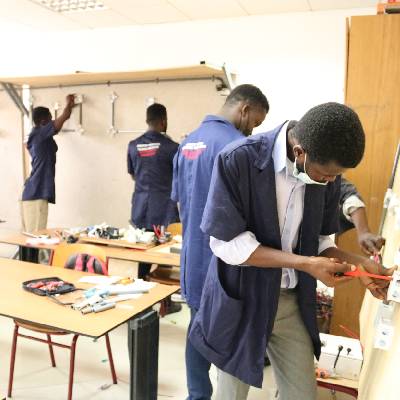
The Bachelor of Science in Information and Communication Technology program combines the essential aspects of computer science (covering areas such as software development, communications and networking, security, systems analysis, databases, and systems software) with the key facets of business and management as they relate to ICT, with a view to producing technically proficient graduates who also understand business and management issues. If you enjoy problem-solving, designing artificial worlds, or making ideas come to life, this Bachelor of Science Information and Communications Technology degree gives you the opportunity to pursue a career that will satisfy you.
The growth and development of information and communication technologies (ICTs) have led to their wide dissemination and application, thus increasing their economic, industrial, and social impact. The Bachelor of Science in Information and Communication Technology (ICT) curriculum provides students with a broad perspective on the nature of technology, how to use and apply a variety of technologies, and to become experts in the development and application of these technologies. The core focus of this degree program is the business information systems cycle where you will learn how to analyze, design, develop, implement and maintain business information systems across a variety of industries and business types. You will also study, software development, multimedia web, and data communications and networking.
It is becoming widely recognized that when developing business practices with a technological foundation, the most difficult (and interesting) problems are not the technical challenges but the organizational and human-centered factors. The BSc in ICT course provides a solid technical foundation so that students have a practical understanding of how software systems are developed, and how such systems are applied in a business context. The course provides rigorous foundations of the concepts of networks and Information Technology. In the final year, students also get an opportunity to do project work and undertake industrial attachment training in the third year of studies. Case studies will amplify your understanding of what works well in modern business practice. The skills developed on this degree are highly sought after by employers and will build a strong foundation for working in the industry.
Career Opportunities
There is great demand for graduates who understand computing technology and create innovative solutions to help people and benefit organizations some of the career opportunities for BSc in ICT students include: Business analyst, Systems analyst, information and communication technology specialist, systems architecture and integration, database programming, Web programming, information system managers, network system engineers, data communication analysts, computer hardware engineers.
Entry Requirements
To qualify for admission into the Bachelor of Science in Information and Communication Technology programme candidates must satisfy the minimum University entry requirements. In addition, the potential students should meet the following requirements:
- Have at least a mean grade of C+ in Kenya Certificate of Secondary Education (KCSE).
- In addition, candidates are expected to have at least a grade C- or above in Mathematics, Physics, or Physical Science.
- Have two principal passes in science subject in KACE and at least a credit in a pass in Mathematics.
- Have a Higher Diploma or Diploma in IT or any other related discipline from a recognized university or college.
- Have a degree from a recognized University.
Objectives of Bachelor of Science in Information and Communication Technology
Information and communication technologies (ICT) are an integral part of our lives, working with ICT involves finding technological solutions to everyday communication needs. This Bachelor of Science in Information and Communication Technology programme aims to meet society?s demands for ICT solutions and prepare a generation of highly skilled specialists in the field.
ICT is the basis for digitalising human communication and affects everyone's lives, most industries, sectors, government agencies and NGOs. New IT systems and services are continually evolving, and people and products are becoming increasingly connected. While technology can improve people's quality of life and help reduce emissions from heavy industries, development requires continually enhanced security. ICT experts are needed to strengthen the protection against industrial espionage, fake news and cyber warfare, or to develop AI, e-health and digital design. As a student on this programme, you find yourself amid the development of phenomena such as 5G, AI, and Data Science.
The programme gives you a combination of knowledge about electronics, software, computer science and communications technology. The programme integrates technology with economics, leadership and sustainable development ? giving you a broad perspective on technological development. The programme has a large proportion of elective courses that give you the opportunity to tailor your education.
The overall objective of the programme is to produce skilled, motivated and internationally competitive Information and Communications Technology graduates to work in both the private and public informatics sector of the economy. The specific objectives of the programme are:
- To produce graduates with the ability to apply business computer networks knowledge, skills, techniques and tools to create best-possible solutions to complex ICT problems.
- To train students with skills necessary to facilitate the acquisition, adoption and adaptation of ICT knowledge, techniques and tools to improve business performance.
- To train graduates who are innovative and creative, who possess good problem-solving skills and are capable of life-long learning.
- To produce all-rounded graduates with demonstrable ethical and professional behaviour, and who possess effective communication, management, entrepreneurial and interpersonal skills.
- To train and equip students with the capability to pursue postgraduate studies.
What you will study
The duration of the Bachelor of Science in Information and Communication Technology program shall be 8 semesters and the courses shall be offered in units.
A course unit is defined as that part of a semester subject described by a coherent syllabus and taught normally over a period of a semester. It is designated as a total of 42 hours.
First-year, First Semester Units
- Introduction to Computer Systems
- Linux/Unix Systems Administration
- Introduction to Programming
- HTML Programming and Internet
- Logical Functions
- Analytical Methods for Computing
- Communication Skills
- HIV and AIDS
First Year, Second Semester Units
- Computer Systems Fundamental
- Programming in Java
- Fundamentals of ICT
- Systems Theory
- Fundamentals of Database Systems
- Data Communications Principles
- Development Studies
- Social Ethics and Integrity
Second Year, First Semester Units
- Systems Development Methods
- Computer Systems Architecture
- Programming in .NET
- Technical and Professional
- Communications Skills
- Multimedia Technology
- Data Structures and Algorithms
- Systems Analysis and Design
- Network Design and Implementation
Second Year, Second Semester Units
- Mobile Communications
- Wireless Internet Applications
- Fundamentals of e-Business
- Operating Systems
- IT Security
- Management Information Systems
- Research Skills and Design
- Entrepreneur Business Process
Third Year, First Semester Units
- ICT Project Management
- Advanced Operating Systems
- ICT Policy and Internet Governance
- ICT Diffusion, Transfer, and Adoption
- Human-Computer Interactions
- Distributed Systems
- Firewalls and Network Defense
- Security
- Independent ICT Capstone Research
Third Year, Second Semester Units
- Network Systems Integration and Maintenance
- Special Topics in Contemporary ICTs
- E-government and Institutional Change
- Service-Oriented Computing
- User Interface Design & Programming
- Software Engineering
- Social Networking Computing
- ICT Group Project
- Industrial Attachment
Fourth Year, First Semester Units
- ICT and Society
- Cyber Law
- Advanced Network Management
- Web Application Technologies
- ICT Policy and Strategic Planning
- Introduction to Knowledge Management
- Innovation Techniques and Models
- Group Design Workshop
Fourth Year, Second Semester Units
- Strategic Management of Information systems
- Fundamentals of Information
- Security Policy & Compliance
- Information Technology and Innovation
- Knowledge Management
- Project
- Geographic Information System
ELECTIVES
- High-Speed Networks
- Networked Multicomputer Systems
- Network Supported Multimedia Technologies
- Performance Modelling of Communications Networks
- Design Topics in Deeply Networked Systems
- Computer and Multimedia Network Security
- Network Business and Distributed
- Information Management
- Advanced Linux/UNIX System Administration
- HPC Cluster, Virtualization and Cloud Computing
Related articles
-

A Guide to Civil Engineering Degree and Diploma Programs in Kenya
08-Nov-2025 -

Electrical Engineering in Kenya: A 2025 Guide for KCSE Graduates
08-Nov-2025 -

Mechanical Engineering in Kenya: A 2025 Guide for KCSE Graduates
08-Nov-2025 -

Engineering Courses in Kenya: A Guide for 2025 KCSE Graduates
08-Nov-2025 -

Education Pathways in Kenya — From Basic Education to Tertiary | College Guide
06-Nov-2025 -

The Bird and the Mirror: A Reflection on Identity, Perception, and Illusion
07-Feb-2025
Colleges offering Bachelor of Science in Information and Communication Technology

Laikipia West
Laikipia University

Kisumu West
Maseno University

Kabondo Kasipul
Jaramogi Oginga Odinga University of Science and Technology

Machakos Town
